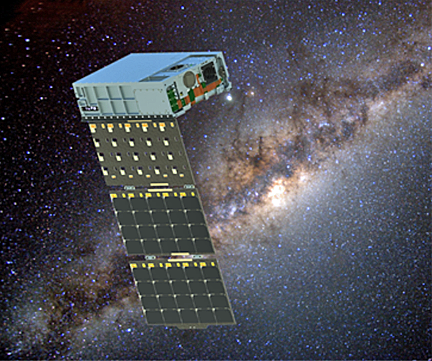
Founded in 2008 with the goal of delivering high-performance, affordable solutions to space missions, Blue Canyon Technologies (BCT) has been awarded a contract to build and test a new 6U-class satellite.
Funded by NASA’s Science Mission Directorate, BCT will deliver the spacecraft bus, ready for instrumentation, to the HaloSat project, which is funded by NASA Goddard Space Flight Center Wallops Flight Facility. BCT’s XB spacecraft is a high-performance smallsat that includes an ultra-precise attitude control system that allows for accurate knowledge and fine-pointing of the payload. This mission builds upon the success of BCT’s recent performance on the MinXSS spacecraft, which is completing its sixth month on orbit. BCT is currently working on more than 15 different spacecraft missions that use the firm's high-performance XB spacecraft bus.

Artistic rendition of the Halo smallsat.
HaloSat is a CubeSat that will measure soft X-ray emissions from the halo of the Milky Way galaxy. The sum of baryons observed in the local universe falls short of the number measured at the time of the cosmic microwave background—the “missing baryon” problem. HaloSat should help determine if the missing baryons reside in the hot halos surrounding galaxies. The HaloSat mission is led by the University of Iowa Principal Investigator (PI), Dr. Philip Kaaret. The team from the University of Iowa, in collaboration with NASA Goddard’s Space Flight Center and Johns Hopkins University, will be developing the science instrument for the HaloSat mission.
Located in Boulder, Colorado, the company is developing a new environmental test facility, increasing manufacturing output, and creating a satellite ground station for single to constellation-sized missions. Working with a grant from the state of Colorado, BCT has been increasing its spacecraft production and test capabilities. BCT is now providing end-to-end mission solutions for their customers.
The HaloSat mission is expected to launch in 2018 via the NASA CubeSat Launch Initiative.


